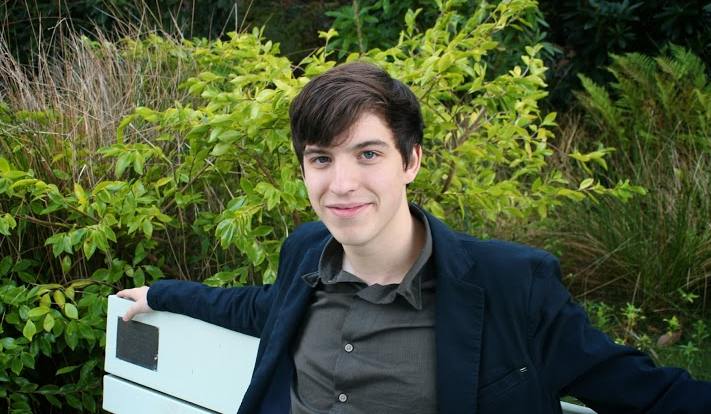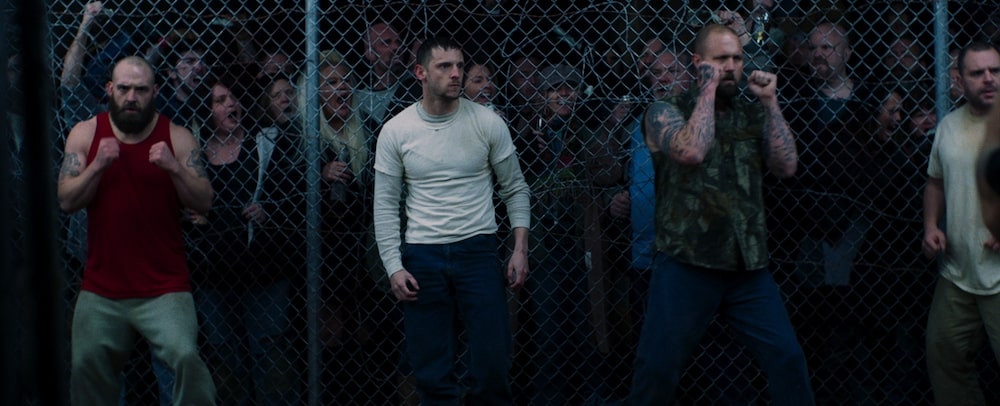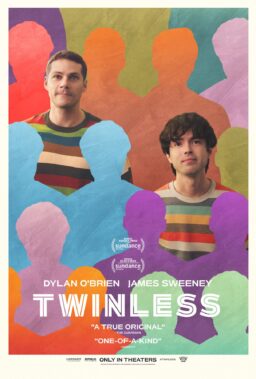To call Tim Sutton’s “Donnybrook” divisive feels like an understatement. Last week, on this very site, critic Odie Henderson called Sutton’s latest “a movie that wants to traffic in Coen Brothers-style nihilism yet lacks any of their storytelling skill.” Conversely, there’s Peter DeBruge’s review in Variety, writing that the film “marks a major step forward in both ambition and style” for Sutton.
Regardless of your feelings, the New York born-and-raised director has steadily built a body of work that’s at once varied and provocative. In contrast to his first three endeavors–“Pavilion,” “Memphis,” and “Dark Night”–“Donnybrook” resembles something closer to mainstream cinema. In it, Jamie Bell plays Jarhead Earl, a down-and-out former Marine who decides to compete in a bare-knuckle brawl. The victor wins $100,000. Based on the novel by Frank Bill, the piece is less about the titular competition and more about the people left behind in fly-over states (in this case, Cincinnati, Ohio).
When I sat down with Sutton, we spoke about the criticism he’s received for this movie, the challenges of working on a larger budget, the economic realities of being an independent filmmaker in 2019, and why he’s compelled to continue making the kind of movies he wants to make–even if they’re not always in vogue.
By conventional narrative standards, “Donnybrook” is the really the first “normal” film you’ve made. Was it difficult adhering to plot in that traditional sense, going from point A to point B? Was it difficult for you to have to like a by five by these more traditional narrative structures where you have to go from point A to point B in some way?
I think it was challenging. I wouldn’t say it was difficult. You know, my movies before were plotless and basically character-less in many ways. You didn’t get to know the characters very well. But part of me answers that by saying like I took it as a challenge. People said, well you know, “Tim Sutton doesn’t work with actors.” Nobody can say that now because I think the performances are very good. Or you know, “Tim Sutton’s not interested in plot.” And in this movie I was very specifically engaged in making that plot kind of come to fruition. There was, of course, challenges: adapting someone else’s work, a working with the teamsters, the kind of scheduling and logistics of a bigger budget and you know, working with character, working with a narrative to make something that was not just the film for the NPR crowd or for the art house. To try and make an art film for a different audience.

The NPR crowd … that’s such a horrifying description.
[laughs] I like the idea of having made three films that are very similar in their size and strategy. And now with this fourth film, I was trying to challenge myself to creating something different.
What were the shooting challenges you mentioned?
Listen, you know there’s one shot at the donnybrook in the parking lot where there’s 300 extras, there’s cars on fire, there’s a big crane shot at the end of the Dolly that literally costs more than the entire film of “Memphis.” And so there were pressures to do stuff a bigger scale. I think it was necessary for the language of this particular film. There was a scale and an operatic climax that I needed to get to. All of this is challenging when you have 22 days to shoot.
Is there any moment where you’re like, “Oh God, we may be in over our heads.”
No! No. Never. Honestly never. You know, Sam, for the same thing when you get on your set, no matter how big or how small, you’ve imagined yourself there a million times. You’ve written the work, you’ve talked and convinced the actors of what the system is. You’ve got your DP right there. Those are the joys of the filmmaking. I more feel like, “Oh, are we over our head” when you’re waiting for financing and you’re powerless. When I’m on set, no matter the size, I totally feel like I could make “Spider-Man 8” if they asked me to. [laughs]
I’d be fascinated in your interpretation of “Spider-Man.” Let’s get into the film itself. “Donnybrook” is about as bruising and dark as they come. Your films are often like this. Honest question: where is this coming from for you? You’re such a sweet, kind guy that I’m always thrown off by the morbidity of your work.
[laughs] And I am a nice guy and I’m a good father and I’m a pretty good husband and I’m a pretty good friend. But then, you know, there are things that I take very seriously that are about positivity or at least a sense of optimism. But there’s a huge part of me that when I sit down to write or when I sit down to read something, there’s a huge vat of darkness. I think some of that just comes from, you know, what’s inside emotionally. You know, maybe it’s lost that I’ve been dealing with since I was a kid. Maybe it’s anger at he situation that we’re in as a country. I knew I wanted to make “Dark Night” because I knew nobody else would.
How did you know that?
Nobody wants to make a movie about people getting shot in a movie theater because A. they’re too smart to do that or B. they don’t want to have that conversation. And I thought if they did want to do that, they were just going to make it into a star-driven vehicle about revenge. I made it as a direct kind of a conversation piece to “Elephant,” just like “Elephant” was a direct conversation piece to Allen Clark’s film. With “Donnybrook,” you know, first of all, it was an opportunity to make money. It was an opportunity to have a job, which I hadn’t had. And simultaneously, you know, I think this country is a very complex, dark, angry, frustrated place and this was a way to evoke a voice in that kind of conversation. I’m not a social issue filmmaker. I have no interest in doing stuff like that. But I do have interest in shining some black light on people and places in America that I think are sparse.

Do you feel that there aren’t enough stories being told about the kind of people you’re depicting in this movie?
Yeah. I think there are movies about addiction or the working class, but what I was just trying to do is tell a very authentic and very frightening story about survival. That has darkness throughout and that ends with a sense of … with every victory comes a greater loss. I think there is not as big a market for that kind of film as there once was. I think Sundance showed with a lot of sales that there’s a certain kind of market for a certain kind of film right now. And you know, I like all different kinds of films and I want to make all different kinds of films. But right now the films coming out of me are about the dark side of the country or of my psyche. I feel comfortable exploring that regardless of the market.
You’re avoiding bringing race into this, but I think it’s impossible not to be on your mind in this project, right?
If you go 40 miles outside of Cincinnati, Ohio to the rural areas there are no black people, first of all. Second of all, I mean this is not a story about white power or about white rage. It’s a story about a part of the country that has no options. And the one option left is to get in the cage that they’ve probably built themselves more than anything or that Ronald Reagan has built or that Donald Trump has built. And they’re in this cage of their own making, fighting it out, you know, for what? For a piece of the American dream that doesn’t really exist. So, you know, I had one Q&A where a well-known filmmaker claimed that it could be seen as a clarion call to the right. And I disagree with that. I don’t think it’s a clarion call. I do think that people on the right will see this movie and possibly see themselves in this movie, but there is no call to action in this. That would’ve been a step too far if that were the case. I think there are people who have tried and tried and tried to do the right thing over and over and it has not worked, and they’re stuck with only their fists.
Some of the criticism towards the movie has been about these people. Critics have suggested that perhaps you’re not intimately familiar with the subjects you’re depicting. What do you make of that?
Well, I disagree with that. They’re just saying who I am through the movies I’ve made before. One of the reasons I took the job of adapting it is because the writing of Frank Bill’s book is spectacular. But secondly, I’m from upstate New York. A lot of the characters and the way they spoke and how I visualized their lives came from the people I grew up with. I grew up with a girl who was always had bruises on her arm and had this far away look when she would stare out the window in middle school. And I always wondered what was her life like at home. And I have friends I knew in school who got arrested early on. It wasn’t my life, but I certainly recognized it and emphasized with it. You know, I know I come across more as like an “art house darling,” but this was no different from “Dark Night” in that I was just trying to see what people’s lives are like.
Doesn’t it seem like your films either hypnotize or anger viewers?
I’d rather it be like that than be in the middle. This movie has been called brutal and it has been called poetic, and I think both are apt. It’s not an average, not a heartwarming film unfortunately. The scathing reviews mean as much to me in this case as the glowing review. It evokes a real response. I think it’s a movie of extremes. I think people who talk about it being stereotypical–that I’m creating stereotypes … I disagree with that because they’re characters in a fiction. And there’s a grandiosity and bombast to the film, but at the same time there’s an authenticity that I totally stand behind. It’s complicated because I’m stuck in the middle with “Donnybrook.” It’s geared towards a bigger audience and certainly a more commercial endeavor. At the same time I’m trying to say things that I think matter.

Last time we spoke, on the record, you spoke candidly about the economic reality of independent filmmaking, and how with “Dark Night” you questioned whether you could continue making the movies you make. Where are you at with that now?
Well, I think during interviews I’m painfully honest. I am who I am. I’m not going to paint any picture that I think is false. This movie gives me the opportunity to continue making movies. And eventually the idea is to make movies that get bigger while still maintaining an intelligence. But as far as work goes, listen …sometimes I wonder if the phone’s ever going to ring and I’m going to get a gig. Sometimes I’m very busy writing a script for hire or doing a polish for hire. “Dark Night” was at a point where I was three art films in and we had just downsized our living and was not making a living for my family. The system of Hollywood is sometimes very interested in me and sometimes less interested. You just have to ride through that train and wait.
What does that interest depend on?
I’ve been told, and I believe this, that the film shows that it’s a quality filmmaking. I think that’s from the source material–through the producing, through the score, cinematography as well as the writing. I think it’s a skilled a piece of cinema. At the same time the subject matter is very difficult and cannot necessarily get me a job directing the next big TV show episodes. Sometimes it has to do with like, “Well you know, right now dark isn’t it.” It’s just these are the movies that I’m making right now and I’m not going to make excuses for them because the market is one thing or another or Hollywood’s interests are one thing or another.
Before we go: are you happy with what you’ve done in this film and where you’re at right now?
Do I think about the fact that I’ve gotten to make four films and most people who want to make movies don’t ever get a film made? Yeah, I think about that a lot and I feel extremely proud and extremely lucky. You know, I look at, I look at IFC’s list of where this film is premiering and if I were a bigger director I’d be a little nervous. But for me it’s like opening in a lot of lot of cities at one time. So I feel ecstatic and excited that people are going to be introduced to my work and in people who’ve never would be introduced to my work.
At the same time it’s a tough, tough business. That might sound like a cliche, but it is very tough in terms of getting work, producing work that you want to make versus what you are expected or told to make. And then it’s very tough when you make three films that you could say unequivocally, you know come from the deepest part of my being, and, and then doing something that, you know, in all honesty, was work for hire in certain ways and it leaves you in a position that’s very new and strange. I’m very proud of “Donnybrook.” I stand by every every frame. But some critics who probably really liked “Memphis” or “Pavilion” are beating me up for doing something like this. When I look at it, when I’m in a good mood I think of when Miles Davis went electric. When artists decide to move forward, whether there’s risk involved or not, you can’t bring everybody with you. Does that make sense? And you have to just be confident that what you’re trying to do is build a body of work that that will stand some kind of test of time. I feel like I’m still in process.












